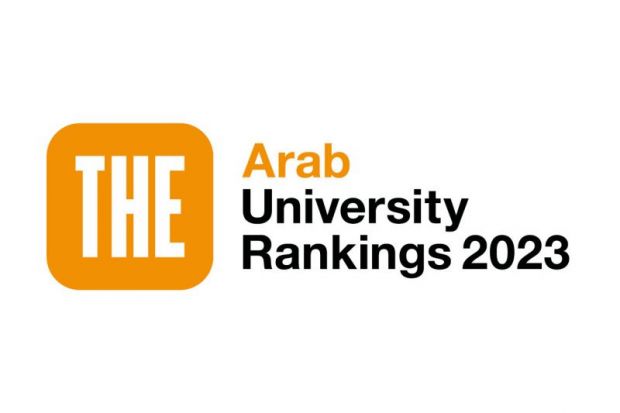A Saudi Arabian university has taken the number one spot in Times Higher Education’s Arab University Rankings 2023 and universities in the country take five of the top 10 positions.
King Abdullah University of Science and Technology (KAUST) in Saudi Arabia moved up from second place last year to take the top spot this year.
United Arab Emirates (UAE) is rapidly catching up with Saudi Arabia as it adds yet another university to the top 10 taking four places – up from three last year and two the year before that. UAE’s Khalifa University climbed up three places to come second this year and Abu Dhabi University jumped up 30 places from last year to 9th this year.
Highlights include:
- KAUST in Saudi Arabia tops the ranking
- UAE’s Khalifa University, which has taken second place, is the country’s highest ranked university
- Qatar University has taken third spot and is Qatar’s only ranked university
- King Khalid University, Saudi Arabia, moved into the top 10 jumping up 19 places from last year to 6th this year
- UAE’s Zayed University moved significantly up the table jumping up from band 61–70 last year to 11 this year
- Lebanon’s highest ranking university is Beirut Arab University which is 12th
- University of Jordan is Jordan’s highest ranked university, which moved up five places last year to joint 16th this year
- Egypt has the most universities in the rankings with 37 (up from 34 last year), followed by Algeria with 35 universities and Iraq and Saudi Arabia both with 32.
This is the third edition of THE’s Arab University Rankings, which reveals the strength of higher education across the Arab region. This year 207 universities across 15 countries are ranked, up from 169 universities in 15 countries last year.
Forty-two universities in the region make their debut in this year’s ranking. Gulf Medical University in the UAE is the highest ranked newcomer coming in the 81-90 band. The countries that had the most new entrants in the rankings, are Algeria with 14 institutions, followed by Iraq with 9 and Egypt and Jordan with four each.
THE’s Arab University Rankings 2023 top 20
|
Institution |
Country |
Rank 2023 |
Rank 2022 |
|
King Abdullah University of Science and Technology (KAUST) |
Saudi Arabia |
1 |
2 |
|
Khalifa University |
United Arab Emirates |
2 |
5 |
|
Qatar University |
Qatar |
3 |
3 |
|
King Fahd University of Petroleum and Minerals |
Saudi Arabia |
=4 |
6 |
|
University of Sharjah |
United Arab Emirates |
=4 |
9 |
|
King Khalid University |
Saudi Arabia |
6 |
25 |
|
United Arab Emirates University |
United Arab Emirates |
7 |
=7 |
|
Prince Mohammad Bin Fahd University |
Saudi Arabia |
8 |
4 |
|
Abu Dhabi University |
United Arab Emirates |
9 |
39 |
|
King Saud University |
Saudi Arabia |
10 |
=7 |
|
Zayed University |
United Arab Emirates |
11 |
61–70 |
|
Beirut Arab University |
Lebanon |
12 |
11 |
|
American University of Beirut |
Lebanon |
13 |
13 |
|
Al Ain University |
United Arab Emirates |
14 |
=15 |
|
King Abdulaziz University |
Saudi Arabia |
15 |
1 |
|
The University of Jordan |
Jordan |
=16 |
21 |
|
Lebanese American University |
Lebanon |
=16 |
37 |
|
Mansoura University |
Egypt |
18 |
14 |
|
American University in Cairo |
Egypt |
=19 |
=15 |
|
King Faisal University |
Saudi Arabia |
=19 |
=15 |
= equals joint
Please note: if you reproduce these any part of these rankings please attribute to ‘Times Higher Education Arab University Rankings 2023’, and include a link to the full ranking on our website Arab University Rankings 2023 and see Arab University Rankings 2023 methodology
KAUST scores a perfect 100 for research environment, one of only two universities to do so – (the other is Qatar University 3rd). KAUST’s scores in the society pillar (measuring industry income, as well as participation and performance in THE’s Impact Rankings) and the international outlook pillar (measuring the share of international students, staff and co-authorship, as well as research collaboration within the Arab world) have improved since last year.
Phil Baty, THE’s chief global affairs officer, said:
“THE’s Arab University Ranking provides universities in the Middle East and North Africa a much deeper, richer and detailed analysis of the diversity and strength of higher education in the region.
“It shows the top of the table being dominated by institutions in the Gulf, which can be distinguished from universities in North Africa. This highlights their different demographics, education models and instruction languages.
“As the ranking develops over the years, we can be sure it will provide even more fascinating insights into higher education in the region, which will be a must read for anyone working in the sector.”
The methodology is based on the same framework as THE’s World University Rankings 2024 with adjustments made to reflect the features and missions of universities in the Middle East and North Africa.
Several updates were made to THE’s World University Rankings 2024 methodology to include unprecedented levels of breadth, depth, detail and assessment of data making it the most rigorous and robust ranking of its kind in the world. This year there are 20 calibrated performance indicators (up from 16 last year), which are grouped into five pillars: teaching, research quality, research environment, international outlook and society. The four new metrics include two that look at research quality, one that examines patents in the Society pillar, and one focuses on outbound exchange student movement in the International outlook pillar. The latter two have been zero weighted this year and will reassessed in future editions.
***ENDS***
